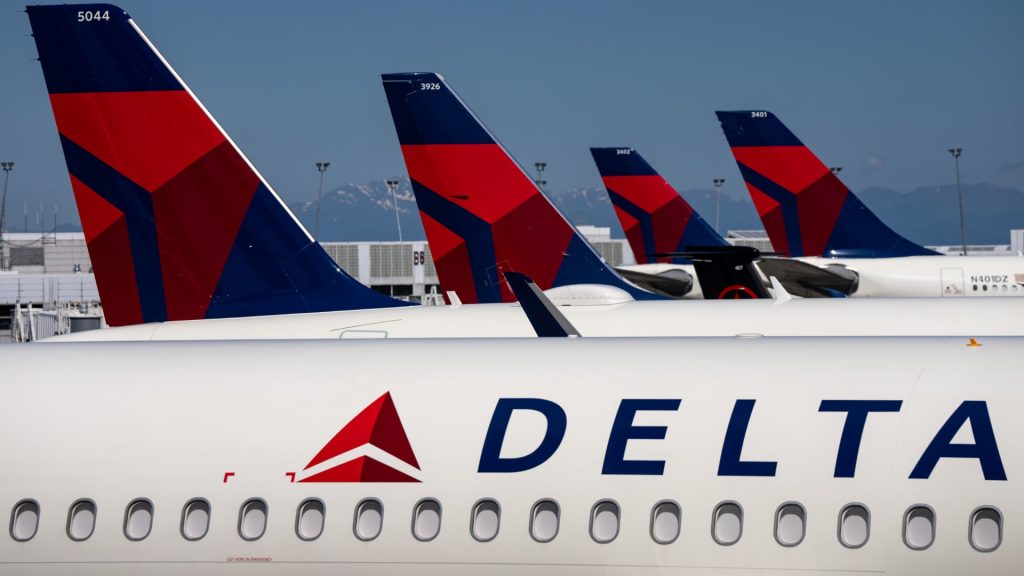Delta Air Lines has reported a cautious outlook for the latter half of the year, citing disappointing bookings as a result of evolving trade policies under the current administration. CEO Ed Bastian has indicated that the airline will not expand its flying capacity as initially planned due to a significant slowdown in both corporate and leisure travel demand. Analysts have responded to Delta’s forecast with caution, slashing their earnings estimates for airlines overall as consumer confidence wanes, further complicating the airline’s growth trajectory.
| Article Subheadings |
|---|
| 1) Delta Air Lines Adjusts Expectations Amid Economic Uncertainty |
| 2) Recent Economic Indicators Impacting Travel Demand |
| 3) Shift in Corporate Travel Patterns |
| 4) Revenue Performance and Future Projections |
| 5) Broader Implications for the Airline Industry |
Delta Air Lines Adjusts Expectations Amid Economic Uncertainty
In its recent earnings report, Delta Air Lines outlined its revised expectations for the second half of the year. The airline’s forecast reflects a potential revenue decline of up to 2%, contrasting with Wall Street’s expectations of nearly 2% growth. Ed Bastian, the CEO of Delta, attributed this cautious outlook to a decrease in bookings influenced by shifting trade policies and a general downturn in consumer sentiment. Delta, known for being the most profitable U.S. airline, had previously anticipated another year of strong travel demand, but Bastian’s latest statements suggest some unease as the company navigates financial uncertainties.
Recent Economic Indicators Impacting Travel Demand
The airline industry is currently facing a backdrop of stagnating economic growth, with Delta being particularly sensitive to recent changes in consumer behavior. According to Bastian, fluctuations in corporate confidence and consumer spending have played a substantial role in travel demand. Particularly, Delta reported that what had started as a strong demand growth of approximately 10% in January has since dwindled significantly, primarily due to companies reassessing their travel policies amid governmental adjustments. The implications of these decisions are far-reaching, emphasizing a need for the airline to adopt a more cautious approach to its operations.
Shift in Corporate Travel Patterns
Delta’s findings reflect a broader trend affecting corporate travel. Many organizations are rethinking their travel budgets and practices in response to reinforcing budget constraints. Bastian noted that while international and premium travel segments remain somewhat resilient, mainstream bookings have not met prior expectations. Among the reasons influencing this trend are the reductions in government workforce, economic hesitancy, and modifications in travel policies noting a delay in business trips. This disruption affects not only Delta but potentially echoes across the airline industry.
Revenue Performance and Future Projections
Despite these challenges, Delta’s initial quarterly performance showcased stability, with a notable rise in net income to $240 million for the three-month period ending March 31, up from $37 million in the previous year. The airline’s adjusted revenues of $12.98 billion remained steady, exactly meeting analyst expectations. However, as the outlook for the rest of the year looks less optimistic, Delta’s executives remain committed to safeguarding its profit margins and ensuring cash flow stability. Adjustments to financial guidance will continue to evolve as more data become available, particularly in a market where consumer confidence seems to be faltering.
Broader Implications for the Airline Industry
Delta’s adjustments signal potentially larger challenges for the airline industry. Following their earnings report, analysts suggested that other major airlines could be facing similar adjustments in their growth expectations. Citing the probability of continued caution in the overall sector, observers anticipate that Delta’s decision to freeze expansion plans may be just the beginning. As more airlines report their earnings, patterns of reduced capacity growth are likely to emerge, reflecting how delicate the current market is under shifting economic conditions.
| No. | Key Points |
|---|---|
| 1 | Delta Air Lines is revising its growth expectations due to disappointing bookings. |
| 2 | CEO Ed Bastian cites consumer and corporate confidence as critical factors in the reduced demand. |
| 3 | Corporate travel patterns are changing, affecting booking rates. |
| 4 | Despite current challenges, Delta saw a rise in quarterly income compared to last year. |
| 5 | Other airlines are expected to follow Delta’s example regarding expansion capacity as market conditions shift. |
Summary
The evolving economic landscape presents impending challenges for Delta Air Lines as it navigates disappointing bookings amid uncertainties in trade policies and consumer confidence. Despite a successful quarterly performance recently, the airline’s adjusted outlook underlines the need for caution and adaptability in an unpredictable marketplace. As the future unfolds, Delta’s decisions and those of its competitors will significantly shape the trajectory of the airline industry as a whole.
Frequently Asked Questions
Question: What were Delta’s projected revenue declines for the coming period?
Delta forecasts potential revenue declines of up to 2% compared to the previous year, a shift from earlier expectations of growth.
Question: How has Delta’s performance changed from last year?
Delta reported a net income increase to $240 million in the recent quarter, significantly up from $37 million last year, indicating a recovery despite market uncertainties.
Question: What factors are affecting corporate travel demand according to Delta?
Corporate travel demand has been affected by a reassessment of travel policies, economic uncertainties, and budgetary constraints faced by many companies.
